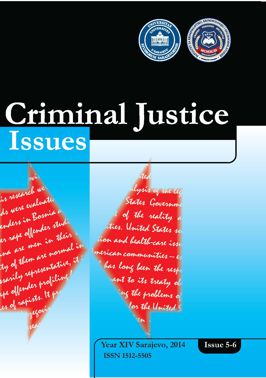DOES LOW SELF-CONTROL PREDICT JUVENILE DELINQUENCY AMONG A NATIONALLY REPRESENTATIVE SAMPLE OF BOSNIAN ADOLESCENTS?
DOES LOW SELF-CONTROL PREDICT JUVENILE DELINQUENCY AMONG A NATIONALLY REPRESENTATIVE SAMPLE OF BOSNIAN ADOLESCENTS?
Author(s): Almir Maljević, Lisa Muftić, Anel Babić, Alen DusparaSubject(s): Psychology of Self, Behaviorism, Criminology, Studies in violence and power, Substance abuse and addiction
Published by: Fakultet za kriminalistiku, kriminologiju i sigurnosne studije Univerziteta u Sarajevu
Keywords: Low self-control; Juvenile Delinquency; Criminological Theory;
Summary/Abstract: Purpose: This study examines the robustness of Gottfredson and Hirschi’s (1990) general theory of crime by examining whether or not low self-control predicts juvenile delinquency among adolescents residing in Bosnia and Herzegovina. It is hypothesized that Bosnian adolescents with lower levels of self-control will be more likely to have engaged in juvenile delinquency (risky behaviors, property violence, and violence perpetration) than Bosnian adolescents with higher levels of self-control. Design/methodology/approach: The current study relies on self-reported survey data from International Self-Report Delinquency Study 2 (ISRD-2). In Bosnia and Herzegovina, students from seventh and eighth grade from 37 primary schools across the country were surveyed (N=1756). Findings: Results from a series of multivariate statistical analyses indicate that low self-control predicts juvenile delinquency among Bosnian adolescents after controlling for important op-posing theoretical and individual characteristics. Theoretical and practical implications stemming from these results are discussed.
Journal: Kriminalističke teme – Časopis za kriminalistiku, kriminologiju i sigurnosne studije
- Issue Year: XVI/2016
- Issue No: 5-6
- Page Range: 1-17
- Page Count: 17
- Language: English

